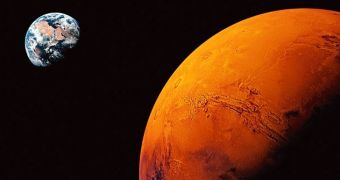Scientists with Brown University in the United States now say that, according to their investigations, it is possible that Mars was not very long ago home to a habitable environment.
This habitable environment comprised several large lakes of liquid water, and evidence indicates that it would have come into being in the aftermath of a volcanic eruption that occurred under an oversized glacier.
In a recent paper, the Brown University researchers detail that the volcano which they believe helped create lakes of liquid water on Mars is dubbed Arsia Mons.
According to Phys Org, this volcano is the Red Planet's third-tallest geological formation of this kind, and about twice as big as planet Earth's Mount Everest. Bottom line, it is one of the largest mountains in the solar system.
Evidence indicates that, about 210 million years ago, Arsia Mons' northwest flank started acting up and eventually erupted. At the time this happened, the region accommodated for a fairly big glacier.
It is believed that, courtesy of the heat that was released during this volcanic eruption, part of the glacier melted and came to form liquid water lakes entrapped in the remaining ice, the Brown University specialists explain.
Since liquid water and life forms are quite fond of one another, the lakes resulting from the Arsia Mons volcanic eruption estimated to have taken place about 210 million years ago are argued to have been worthy of being called habitable environments.
Specialist Kat Scanlon estimated that lava originating from Arsia Mons volcano could have birthed at least two lakes containing 40 cubic kilometers (about 9.6 cubic miles) of water each and one containing 20 cubic kilometers (roughly 4.8 cubic miles).
Granted, harsh environmental conditions present on the Red Planet mean that these lakes would not have survived on the long run. Still, Brown University graduate Kat Scanlon claims that they probably stuck around for a few hundred, maybe even a few thousand years.
Supposing that the Red Planet did in fact accommodate for microbial life forms at one point in its history, this window of opportunity would have been more than enough for them to colonize these newly formed lakes.
In all fairness, hearing scientists talk about how Mars might have housed habitable environments in its recent history and then learning that their idea of recent is 210 million years ago might be a bit confusing.
Still, Kat Scanlon stresses that, when compared to sites believed to have been habitable 2.5 billion years ago, the alleged habitable environments close to the Arsia Mons volcano are fairly young.

 14 DAY TRIAL //
14 DAY TRIAL //